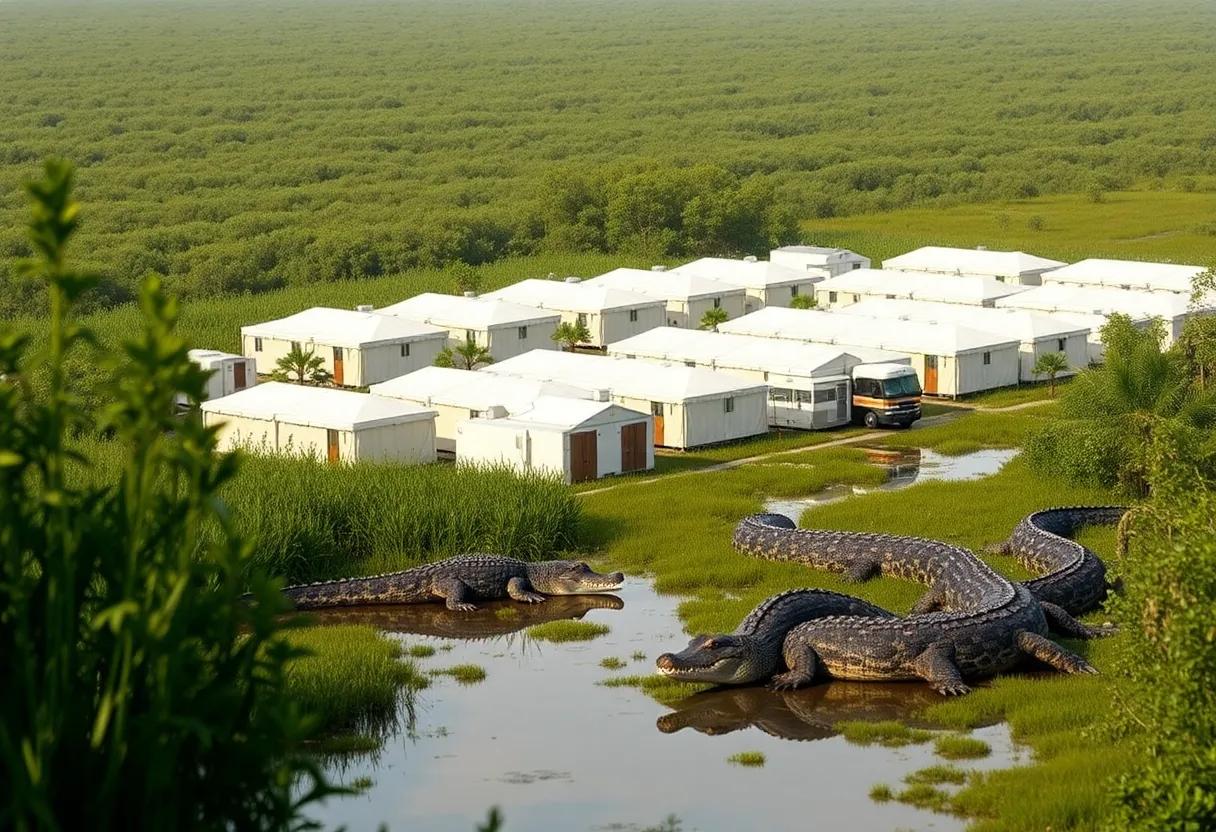News Summary
The federal government has approved funding for a new immigration detention center in Florida, aptly named ‘Alligator Alcatraz.’ Located in the Everglades, it will house up to 5,000 detainees, focusing on immigrants with criminal records. Despite the urgency of its construction, local leaders express concerns regarding the environmental impact on the fragile ecosystem. As construction begins, the facility is intended to enhance immigration enforcement in Florida under the Trump administration’s policies, sparking debates around border security and community safety.
Florida’s New “Alligator Alcatraz” Immigration Facility Approved
In an exciting development for immigration enforcement in Florida, the federal government has taken a significant step forward by approving funding for the establishment of various immigration detention centers in the Sunshine State. At the heart of this initiative is a proposed site nestled in the vast Everglades, charmingly dubbed the “Alligator Alcatraz.” This facility is set to house immigrants with criminal records as part of the broader strategy to address immigration issues under the leadership of the Trump administration.
Funding from FEMA and Rapid Development
The bulk of the funding for these detention centers will come from the Federal Emergency Management Agency’s (FEMA) shelter and services program. This program is designed to assist cities and organizations grappling with an influx of migrants and asylum-seekers. The urgency of this project is emphasized by Florida Attorney General James Uthmeier, who has confirmed that plans for expanding the federal government’s capacity to detain immigrants are moving forward at a brisk pace.
Alligator Alcatraz: What It Will Look Like
The Everglades site, set to repurpose a large and mainly abandoned airfield, is expected to have the capacity to house up to 5,000 detainees. Construction on the facility is already underway, with work starting just this Monday morning. By the time early July rolls around, the facility should be ready for operations.
Uthmeier emphasizes that Alligator Alcatraz is designed to be secure, taking advantage of its unique natural surroundings that include alligators and pythons. He paints a picture of a facility that will feature light infrastructure, making use of tents and trailers rather than heavyweight permanent structures.
Community Concerns and Environmental Impact
However, this proposal has raised eyebrows, especially among local leaders concerned about the potential environmental impact on the delicate ecosystem of the Everglades. Miami-Dade County Mayor Daniella Levine Cava has voiced her apprehension over the facility’s potential effects and is calling for more detailed information regarding the security risks it could pose to both the environment and the community.
The purchase price for the facility’s new location has been set at a surprising $20 million, particularly noteworthy when considering it was appraised at approximately $190 million. This significant discount raises questions about the deal and how it may affect future operational costs. Projections suggest that running the facility could cost around $450 million per year, with plans to seek reimbursement from FEMA to help ease the financial burden.
Political Context and Broader Strategy
This initiative aligns with efforts from various Republican-led states to reinforce stringent immigration policies backed by the Trump administration. Law enforcement in these states, including Florida, are now working to enforce federal immigration laws more rigorously, reflecting a nationwide push to tackle illegal immigration issues more effectively.
While the plans for Alligator Alcatraz push forward, they also face considerable opposition. Residents and environmental advocates are voicing their concerns, leading to protests focused on both the implications for local communities and the potential ecological disruption in the Everglades.
The plan’s progression emphasizes Florida’s leading role in immigration enforcement, which is seen as a critical aspect of national policy. As the developments unfold, local officials are committed to collaborating with the Trump administration to tackle illegal immigration issues head-on.
As Alligator Alcatraz moves from concept to reality, it remains to be seen how it will impact the lives of many individuals and the surrounding environment. The balance between enforcement and community concerns is sure to be a topic of discussion in the weeks to come.
Deeper Dive: News & Info About This Topic
- Miami Herald
- Wikipedia: Immigration in the United States
- BBC News
- Google Search: Immigration Detention Centers
- The New York Times
- Google Scholar: Florida Immigration Policy
- CBS News
- Encyclopedia Britannica: Immigration
- Orlando Sentinel
- Google News: Florida Alligator Alcatraz
- WPTV

Author: STAFF HERE FLORENCE WRITER
The FLORENCE STAFF WRITER represents the experienced team at HEREFlorence.com, your go-to source for actionable local news and information in Florence, Florence County, and beyond. Specializing in "news you can use," we cover essential topics like product reviews for personal and business needs, local business directories, politics, real estate trends, neighborhood insights, and state news affecting the area—with deep expertise drawn from years of dedicated reporting and strong community input, including local press releases and business updates. We deliver top reporting on high-value events such as the Florence Festival of Lights, Pee Dee Pride, and agricultural expos at the Florence Center. Our coverage extends to key organizations like the Florence Regional Chamber of Commerce and the Pee Dee Area Council of Governments, plus leading businesses in healthcare and retail that power the local economy such as McLeod Health and Pee Dee Electric Cooperative. As part of the broader HERE network, including HERECharleston.com, HEREColumbia.com, HEREGreenville.com, and HEREHiltonHead.com, we provide comprehensive, credible insights into South Carolina's dynamic landscape.





